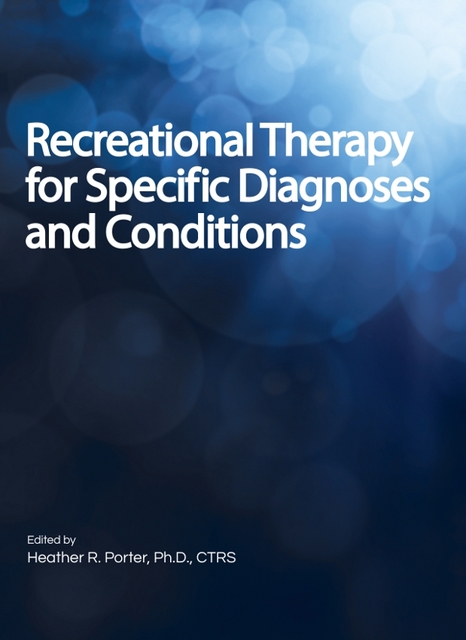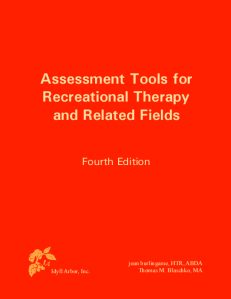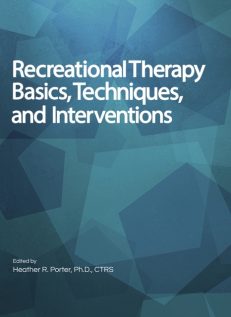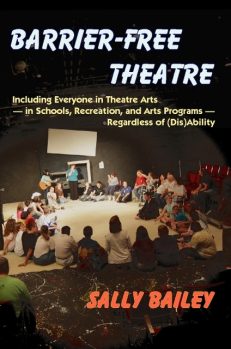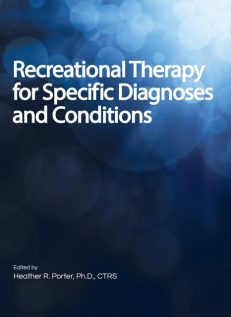Description
Recreational Therapy for Specific Diagnoses and Conditions offers detailed descriptions of 39 diagnoses and conditions that are treated by recreational therapists. This book provides a concise guide to evidence-based practice for each diagnosis and condition, explains how to accurately connect recreational therapy treatment with the client’s diagnosis to improve reimbursement for therapy, and suggest ways to standardized practice using the World Health Organization’s International Classification of Functioning, Disability, and Health (ICF).
Forty-one experts in recreational therapy and related disciplines offer the latest information about 39 sets of diagnoses and conditions that are treated by recreational therapists. Each chapter contains a detailed description of the diagnosis or condition, including:
* Incidence or prevalence and ages most affected
* Causes
* Social, emotional, and bodily systems affected
* Secondary problems
* Prognosis
* Assessment process for the whole treatment team and, in more detail, the recreational therapist, including specific assessment tools and connections to the categories of the ICF
* Recreational therapy treatment interventions and their efficacy, along with the typical scope of team interventions, including how treatment is tied to the assessment and the ICF
* Further resources for therapists, clients, and families
Diagnoses and Conditions Covered
Amputation and Prosthesis
Attention-Deficit/Hyperactivity Disorder
Autism Spectrum Disorder
Back Disorders and Back Pain
Borderline Personality Disorder
Burns
Cancer
Cerebral Palsy
Cerebrovascular Accident
Chronic Obstructive Pulmonary Disease
Diabetes Mellitus
Epilepsy
Feeding and Eating Disorders
Fibromyalgia and Juvenile Fibromyalgia
Gambling Disorder
Generalized Anxiety Disorder
Guillain-Barre’ Syndrome
Hearing Loss
Heart Disease
Intellectual Disability
Major Depressive Disorder
Multiple Sclerosis
Neurocognitive Disorders
Obesity
Oppositional Defiant Disorder and Conduct Disorder
Osteoarthritis
Osteoporosis
Parkinson’s Disease
Post-Traumatic Stress Disorder
Pressure Ulcers
Rheumatoid Arthritis
Schizophrenia Spectrum and Other Psychotic Disorders
Sickle Cell Disease
Spina Bifida
Spinal Cord Injury
Substance-Related Disorders
Total Joint Replacement
Traumatic Brain Injury
Visual Impairments and Blindness
Contributors
Jared Allsop, MS, CTRS
Andrew Bogenschutz, MS, CTRS
John Campbell, PsyD
Jodie Charters, MS, CTRS
Jo Ann Coco-Ripp, PhD, LRT/CTRS
Dawn DeVries, DHA, MPA, CTRS
Kathryn Elokdah, EdM, CTRS, ATP
Donna Gregory, MBA, CTRS
Lei Guo, PhD, LRT/CTRS
Brenda Hart, MS, MEd, CTRS
Natalie Haynes, MEd, MS, CTRS
Julie Hoehl, BS, CTRS, HF/S, BFC
Laurie Jake, BS, CTRS
Ruthie Kucharewski, PhD, CTRS
Joy Laurer, DNP, MSN, PMHCNS-BC, RN
Stephen Lewis, PhD, CTRS
Donna Long, MEd, CTRS
Susan Lynch, PhD, CTRS
Kenneth Mobily, PhD, CTRS
Kathy Neely, ReD, CTRS
Barbara Parker, BS, CTRS
Dean Parker, MS, CTRS
Margalyn Payne, MS Ed, CTRS
Tara Perry, PhD
Heather Porter, PhD, CTRS
Mary Lou Schilling, PhD, CTRS
Arlene Schmid, PhD, OTR
Karen Smith, MLS
Rachel Smith, MS
Gretchen Snethen, PhD, CTRS
Anne-Marie Sullivan, PhD, CTRS
Juan Tortosa-Martinez, PhD, CTRS
Jasmine Townsend, PhD, CTRS
Marieke Van Puymbroeck, PhD, CTRS
Nannette Vliet, EdM, CTRS
Karen Wenzel, MA, CTRS
Brenda Wiggins, PhD
Stephanie Wood, MA, CTRS
J. Randal Wyble, MS, CTRS
Heewon Yang, PhD, CTRS
Daniel Yoder, PhD
Forward
The chapter authors and I are excited to provide this updated set of diagnoses and conditions. Since the first edition of the book we have been able to add eleven new chapters. We have been able to update the chapters that are based on the fifth edition of the Diagnostic and Statistical Manual of Mental Disorders (DSM-5), which means that recreational therapists who read this volume will have the latest information when they are working in the field of mental health. We plan to add information on the tenth edition of the International Statistical Classification of Diseases and Related Health Problems (ICD-10) in the next edition.
Looking at the field of recreational therapy, it is wonderful to see how many places we can document the efficacy of the practices described in this volume. There are still many things recreational therapists do that have not yet been proven through research, but, compared to the first edition, this volume takes a large step forward in presenting information on the work researchers and professionals in the field have done to make recreational therapy an efficacy-based practice. Because this is a book of recreational therapy practice, rather than a book about recreational therapy efficacy, we have included areas of recreational therapy practice that have not been demonstrated to be efficacious yet. We hope that by the next edition many more of them will have been proven to be effective.
Lastly, we are most excited to be able to describe our practice in terms of the International Classification of Functioning, Disability, and Health (ICF). We believe that being able to do this demonstrates that what we do is at the cutting edge of healthcare practice. When we provide treatment to those who have the diagnoses in this volume, we are doing so much more than treating their medical condition. We are finding ways to restore their minds, bodies, and spirits to the best possible levels of personal, interpersonal, societal, and environmental well-being. No other field takes on such a meaningful set of challenges. — Heather Porter
Heather Porter, Ph.D., CTRS, is a faculty member in the Rehabilitation Sciences Department at Temple University in Philadelphia, PA. She has a dual BS in Recreational Therapy and Sport/Recreation Management, an MS in Counseling Psychology with a Certificate in Marriage and Family Counseling, and a Ph.D. in Health Studies (Recreational Therapy and Public Health). She has a strong clinical background in inpatient and outpatient physical rehabilitation and has been teaching recreational therapy in higher education for over 18 years. She is committed to strengthening recreational therapy research and disseminating research information to practitioners, consumers, payers, legislators, and the general public. Most notably, she coordinates an annual Recreational Therapy Evidence-Based Practice Conference and maintains an open-access database for recreational therapy research and resources that has been utilized by over 60 countries (www.rtwiseowls.com). Dr. Porter also provides consultations to recreational therapy academic programs on how to integrate evidence-based research into academic coursework, and is recognized as a leader in the community seeking to integrate the World Health Organization’s International Classification of Functioning, Disability, and Health into healthcare practice.

